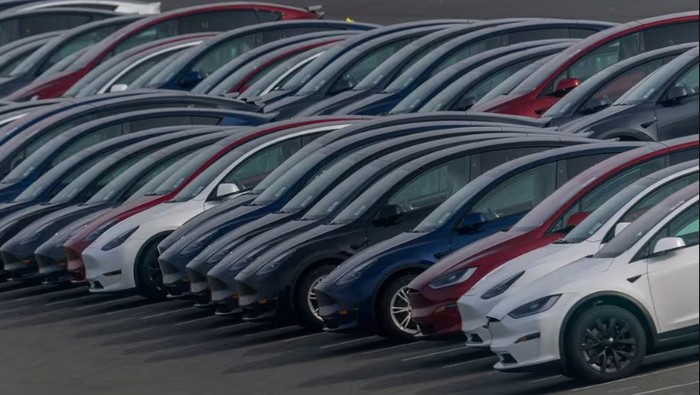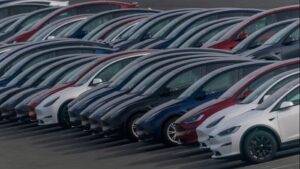

gloanna.com, JakartaWelcome to the electrifying world of Tesla, where innovation meets ambition under the visionary leadership of Elon Musk. In a groundbreaking move aimed at revamping its competitive edge in China’s bustling electric vehicle market, Tesla has recently slashed its prices. Let’s delve into how this strategic decision by Elon Musk is shaking up the industry and what it means for both Tesla and Chinese consumers.
China Importance in the Electric Vehicle Market
China plays a pivotal role in the electric vehicle market, not only as the world’s largest automotive market but also as a key driver of clean energy initiatives. With a growing emphasis on sustainability and reducing carbon emissions, Chinese consumers are increasingly turning to electric vehicles as a more environmentally friendly transportation option. The Chinese government has been actively promoting the adoption of electric vehicles through various incentives such as subsidies, tax breaks, and infrastructure development. This proactive approach has helped create a conducive environment for electric vehicle manufacturers to thrive in China.
Moreover, with advancements in technology and manufacturing capabilities, Chinese companies have been able to produce high-quality electric vehicles at competitive prices. This has further fueled the growth of the electric vehicle market in China and positioned the country as a global leader in this industry. China’s importance in the electric vehicle market cannot be understated – it serves not only as a major consumer base but also as an innovative hub driving advancements in sustainable transportation solutions.
Reasons for Tesla’s Decreasing Competitiveness
As a groundbreaking pioneer in the electric vehicle industry, Tesla has long been at the forefront of innovation and sustainability. However, recent challenges have led to a decrease in its competitiveness, particularly in key markets like China. One significant factor contributing to this decline is the increasing number of competitors entering the electric vehicle market. With more companies investing heavily in EV technology, Tesla is facing stiffer competition than ever before.
Moreover, issues related to supply chain disruptions and production delays have also impacted Tesla’s ability to meet consumer demand efficiently. This has resulted in potential customers turning towards other brands offering more readily available options. Additionally, changes in government policies and regulations can also play a role in affecting Tesla’s competitiveness. Adapting to new guidelines and standards while maintaining profitability poses a challenge for the company as it navigates through dynamic market conditions.
Impact of Lowered Prices on Chinese Consumers
Tesla’s decision to lower prices in China is sending ripples through the electric vehicle market. Chinese consumers, known for their price-conscious shopping habits, are now presented with a more competitive option in the form of Tesla vehicles. With affordability being a significant factor influencing purchasing decisions, these reduced prices could potentially sway many buyers towards choosing Tesla over other brands.
The impact of lowered prices extends beyond just attracting new customers; it also plays a crucial role in retaining existing ones. For those who were considering alternative electric vehicle options due to cost concerns, this pricing adjustment might just be the push they needed to stay loyal to Tesla. Furthermore, by making their vehicles more accessible to a wider range of consumers in China, Tesla is positioning itself as a formidable player in the market. This move not only benefits Chinese consumers but also solidifies Tesla’s foothold and competitiveness in one of the largest electric vehicle markets globally.
Comparison with Other Electric Vehicle Brands in China
When it comes to the electric vehicle market in China, Tesla has been a prominent player for years. However, with the recent price adjustments made by Elon Musk to boost competitiveness, how does Tesla fare against other electric vehicle brands in the country? Chinese consumers have a variety of options when it comes to choosing an electric vehicle. Brands like NIO, Xpeng Motors, and BYD have established themselves as strong contenders in the market.
NIO, known for its high-performance electric vehicles and innovative battery swapping technology, has gained popularity among Chinese consumers. Xpeng Motors offers smart features and competitive pricing that appeal to tech-savvy buyers. On the other hand, BYD is a leading Chinese automaker with a wide range of electric vehicles catering to different consumer preferences. These domestic brands pose significant competition to Tesla in terms of pricing and localized offerings. As Tesla adjusts its prices in China to regain competitiveness, it will be interesting to see how these rival brands respond and how consumers perceive the evolving landscape of the electric vehicle market in the country.
Potential Benefits and Consequences for Tesla
With the lowered prices of Tesla vehicles in China, potential benefits and consequences are expected to unfold for the electric car manufacturer. On one hand, reduced prices could attract a wider range of Chinese consumers who were previously hesitant due to high costs. This move may increase Tesla’s market share in China and solidify its position as a key player in the electric vehicle industry.
However, there could be potential consequences as well. Lowering prices might impact Tesla’s profit margins initially, leading to short-term financial challenges. Competitors in the Chinese market may also respond by adjusting their own pricing strategies to remain competitive. Despite these risks, Tesla’s decision to lower prices demonstrates its commitment to expanding its presence globally and adapting to local market conditions. Only time will tell how this strategy will ultimately shape Tesla’s future in China and beyond.
Conclusion
Elon Musk’s decision to lower Tesla prices in China reflects the company’s commitment to maintaining its competitiveness in the global electric vehicle market. The move not only benefits Chinese consumers but also positions Tesla strategically amidst growing competition from local and international electric car manufacturers. By adapting to market dynamics and consumer demands, Tesla demonstrates its agility and willingness to evolve.
As the landscape of electric vehicles continues to evolve rapidly, it will be intriguing to witness how Tesla navigates these changes while upholding its position as a pioneer in sustainable transportation. With Elon Musk at the helm, Tesla seems poised to tackle challenges head-on and emerge stronger than ever before. Watch this space for more updates on Tesla’s journey in China and beyond!






